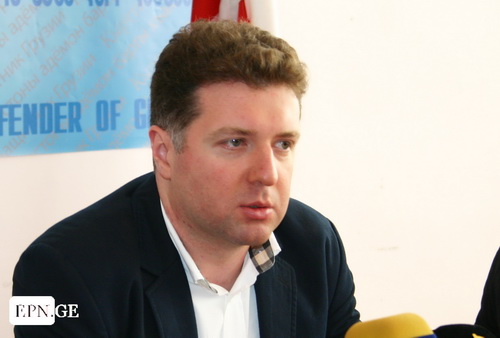Kakheti Information Center
According to statement made by the public defender of Georgia, Giorgi Tugushi, after studying the resolution of Tbilisi City Court that fined Irakli Kakabadze, Aleko Chigvinadze and Shota Digmelashvili detained on August 15th, many problems are revealed that are taking systematic nature in nowadays court practice.
“The resolution indicates that Kakabadze, Chighvinadze and Digmelashvili violated article 173 of Georgian Code of Administrative Offenses that was reflected in the violation of the public order by the abovementioned individuals; standing in the carriageway of the George Bush St. and hindering the transportation. Besides, they were dying the picture. They did not obey the lawful order of police and resisted.
The reported video material shows that the protest rally participants never hindered the traffic transportation. They were standing in the so-called “safety island” reading poems, that does not represent the violation of the requirements of the Georgian Code of Administrative Offenses.
The video material shows well that the protest rally participants never resisted the detainment and obeyed the requirements of the patrol police officials.
According to the Court explanations, the violation took place when the protest rally participants did not obey the command of police to stop writing on the billboard. The patrol-inspector explanation is provided as an evidence of this fact.
Besides, as the public defender is informed that the Court did not satisfy the application of the defense side which was asking for presenting the abovementioned video material in the Court process that could reveal the actions of protest rally participants and the police officials.
Considering that administrative case proceeding predicates the full, thorough and objective search of the case circumstances, it is important to study all the possible evidence of the case. The public defender numerous times emphasized the fact that existing practice perceptibly differs from the above mentioned principle and the court reclines on the record of administrative offenses as a primary evidence and the explanations of the representatives of legal organs.
This problem is connected to the lack of evidence. In the concrete case, on one side, the court indicates that in the process of court proceedings, it discussed the record of the offenses and materials, heard the explanations of both sides, the testimonies of the witnesses, but, on the other side, in its discussion and argumentation it reclines the testimonies and explanations of the representatives of legal entities and uses less information and witness testimonies provided by the defense side.
Besides, the public defender again indicates the problem of administrative proceeding which is connected to the independent use of article 173 of the code of administrative violations. This article considers the imposing of responsibility for disobedience of the lawful orders of the legal organ representatives. In order to satisfy this composition, the unlawful act is needed, the stop of which would be ordered by the legal office to an individual and he/she would not obey the command. Though, it is vague which lawful order was disobeyed, when the record of offenses relied only on article 173.
The same issue is raised in the current case. The court decides that only article 173 of the Code has been violated without indicating that the violation of this article was caused by the violation of another norm. The court discusses that the violation of article 150 might have taken place, but indicates thereby, that “in this case the court does not examine the case according to article 150.”
The public defender numerous times emphasized on these problems, including in the report of the second half of 2009. “Though, the court practice reveals that the problems emphasized by us are still actual and an adequate response is needed,” – states public defender.
News
December 13, 2023
Ethnic minorities outside the peace dialogue
November 6, 2023
‘Peace’ agenda of political parties
Popular
Articles
February 13, 2024




